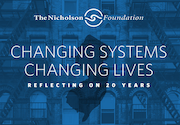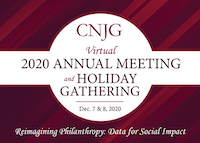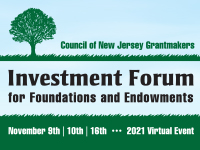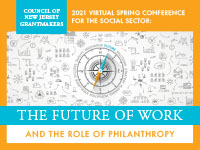Site Search
- resource provided by the Forum Network Knowledgebase.
Search Tip: Search with " " to find exact matches.
The Inclusive Growth ScoreTM provides local planners, governments and impact investors with a clear, simple view of social and economic indicators for any census tract in the United States.
A sample conflict of interest form for independent private foundations.

For 20 years, The Nicholson Foundation worked to advance meaningful change in safety net service systems in New Jersey. Its grantmaking journey is described in Changing Systems, Changing Lives: Reflecting on 20 Years. Through stories and related text, the book showed how a small family foundation could take six guiding themes and put them into action through grants and partner support. In the process, the Foundation collaborated to spur real systems change that benefitted individuals, families, and communities. A recent scholarly paper built on that work, helping to make the Foundation’s approach broadly accessible to researchers, academics, and philanthropists. “A Framework for Creating Systems Change,” by Drs. William Brown and Wynn Rosser published in The Foundation Review, presents a new model for systems change. Five of the model’s seven components reflect themes in Changing Systems, Changing Lives. The sixth component slightly shifts the emphasis of the Foundation’s “Engaging with Government” theme, and the seventh highlights the Foundation’s overall approach by including performance measurement as a distinct and separate component of the model.
Download or order a free hard copy of The Nicholson Foundation book, "Changing Systems, Changing Lives"
Read Brown W, Rosser W. "A Framework for Creating Systems Change". The Foundation Review, 2023;15(4):50-6.
ValuesAdvisor, a nonprofit online platform, helps you find the financial expertise needed to implement a mission-aligned investment strategy. Access to ValuesAdvisor is provided at no cost as a benefit of your membership in CNJG.
ValuesAdvisor offers a searchable database of values-oriented investment advisors, who have been suggested by other trusted affinity groups and philanthropy-supporting organizations. The platform offers a simple and dynamic interface that allows you to filter advisor information on data points such as minimum account size, amount of values-aligned AUM, impact themes, service offerings, asset classes, diversity, and other key information. Note: the platform does not collect user data and is committed to preserving the anonymity of the asset owners who use the platform.
To join, visit the ValuesAdvisor website and enter 'CNJG' at checkout to claim your free access.
To Get Started/Questions:
Kate Simpson, Head of Outreach, ValuesAdvisor
Email: [email protected]
If you have an advisor you’ve worked with who has helped your foundation align your investments with your mission, and believe your peers would benefit from working with, you can suggest them for the ValuesAdvisor platform in their short, “Suggest an Advisor Form.”
For more information, please watch this video or download the infographic below.
Join funders for a discussion on the New Jersey Pandemic Relief Fund.
First Lady Tammy Murphy launched the New Jersey Pandemic Relief Fund (NJPRF), hosted by the Community Foundation of New Jersey, to fight against the ongoing pandemic by directing funds to local organizations providing “on the ground” services to our state’s most vulnerable populations.
On this webinar, we will hear from Executive Director of NJPRF, Josh Weinreich and President of the Community Foundation of New Jersey, Hans Dekker. Together, they will discuss how funds are being collected and distributed, how NJPRF will help fill gaps in services across the state, and the importance of coordinated efforts between government and the private sector.
The various funds being set up by New Jersey foundations and philanthropic leaders can help ensure funding is directed to areas of greatest need, encourage greater collaboration among grantmaking, nonprofit, and government partners, and create a stronger, more resilient state. Register now to hear about how the New Jersey Pandemic Relief Fund is providing essential support for our communities.
Cost: Free for CNJG Members and Nonmember Grantmakers
This program is open to Grantmakers only.
Webinar Video
The Council of New Jersey Grantmakers invites members – and prospective members – from across the state to gather for an evening of connection and community. Rooted in CNJG’s mission of fostering shared learning, collaborative and trusting relationships, and network building, this event invites philanthropic peers to connect, converse, and cultivate meaningful connections in a welcoming and convivial setting.
The afternoon will include a brief welcome from CNJG leadership and our hosts followed by open time to mingle, share stories, and strengthen the trusted relationships that form the heart of our community. A tour of the arboretum grounds will be available for those interested.
Whether you are looking to reconnect with long-time colleagues, meet new peers from across the state, or cultivate new ideas that may spark future collaborations, this social offers the chance to deepen relationships that sustain and strengthen New Jersey’s philanthropic sector.
About the Arboretum: Once a country estate, Reeves-Reed Arboretum is now a 13.5 acre public garden listed on the National and State Registers of Historic Places. Its estate and gardens represent design trends by prominent late 19th and early 20th century landscape architects, including Calvert Vaux, a partner of Frederick Law Olmsted. More information can be found here.
This meeting is for grantmakers only.
There is no cost to attend this event.
Light refreshments will be provided.
CNJG thanks Investors Foundation and the Maher Charitable Foundation for underwriting the costs of the social

Please Log In to view resources from this event.
Reimagining Philanthropy: Data for Social Impact
Held:
Monday, December 7 - 2:00 to 3:30 pm -- Skill-Building Workshop
Tuesday, December 8 - 12:30 to 2:00 pm -- Business Meeting & Keynote Presentation
Thank you to everyone who attended CNJG’s first ever virtual Annual Meeting & Holiday Gathering. This year’s meeting focused on the many ways philanthropy can use data for social impact.
Data science is a powerful tool to address housing and food insecurity, education inequality, health disparities, civic injustice, and other longstanding social issues that continue to intensify during the pandemic. Building data capacity equips local leaders with information to develop and advocate for more effective policies. New evaluation strategies can outperform outdated processes that reinforce inequities and slow progress. Research and technology that fuels innovation in the private sector can help nonprofit and government organizations drive impact in New Jersey communities..
On Day 1, the Annual Meeting Workshop focused on evaluation and learning practices that center equity and social impact. And on Day 2, Keynote panelists shared how data science can help connect people to services, address racial inequity, and create greater impact in our communities during the pandemic and beyond..
Philanthropy can’t go back to “normal,” because normal wasn’t good enough. During this year’s Virtual 2020 Annual Meeting & Holiday Gathering we explored how we can reimagine philanthropy by harnessing the full power of data for social impact.
The Council of New Jersey Grantmakers would like to thank our sponsors for their generous support: Signature Sponsors – Novartis and PSEG; Sustaining Sponsors – Prudential and Horizon Blue Cross Blue Shield of New Jersey; Collaborating Sponsor – Robert Wood Johnson Foundation; and Performance Sponsor – The Provident Bank Foundation.

Dates & Times
Tuesday, November 9 - 1:00 to 5:00 p.m.
Wednesday, November 10 - 1:00 to 5:00 p.m.
Tuesday, November 16 - 1:00 to 5:00 p.m.
CEOs, executive directors, CFOs, trustees, investment committee members, and finance managers of foundations and endowed nonprofits gathered together over three afternoons of learning and discussion during CNJG’s 2021 Investment Forum for Foundations and Endowments.
Attendees heard from leading asset managers, financial service institutions, professional advisors and practitioners who shared best practices and valuable insights focused on successful endowment management. Pointed, strategic, and masterful keynote speeches and educational workshop sessions explored a wide range of timely and useful topics, such as impact and ESG investing, gift acceptance policies, alternative investments, governance and due diligence, and so much more.
Sustainable philanthropy thrives on careful and skillful stewardship of the corpus. This signature event grew out of the Council of New Jersey Grantmakers’ Finance and Investment Affinity Group convenings, which have long offered CFO’s, investment committee members, board chairs and others with oversight of their endowment, exposure to a wide range of representatives, as well as thoughtful expertise and perspectives from the investment community.
Access Whova until May 16, 2022!
Registrants can access all three plenary sessions and 11 concurrent sessions on Whova for six months after the event, until May 16, 2022. You can log in with the same email and password you used to access the event. Visit Whova.
For questions, please contact Anna D'Elia, Manager of Programs and Learning.
The Future of Work and the Role of Philanthropy

Dates: Wednesday, May 19 and Thursday, May 20
Time: 2:00 to 5:00 p.m.
One of the most valuable learning and networking events for the social sector in the state, CNJG’s 2021 Virtual Spring Conference considered the role of philanthropy in shaping how, where, and why we work.
The coronavirus pandemic has impacted and propelled the future of work in ways we couldn’t have imagined. But even before the pandemic - the automation of jobs, the gig economy, the ongoing need for reskilling and retraining, changing demographics, green careers, lack of job security and more – has been setting the stage for novel ways of working. The Spring Conference explored this new, accelerated work paradigm, it’s profound impact on New Jersey’s industries, workers and communities, and the implications for grantmakers and their nonprofit partners.
This timely and important event brought together national and local thought leaders, experts and stakeholders to share what the social sector can do to ensure a better future for New Jersey’s workforce. Attendees engaged in candid, visionary conversations around equitable labor standards and professional practices, the changing, post-pandemic workplace, strategies to fill gaps in skills, education, and opportunity, the effects of new federal job policies on workers, and much more.
Thank you for joining the Council of New Jersey Grantmakers for an exploration about what lies ahead as we prepare for and address pressing and unprecedented changes in the world of work.
Only people who registered for the Conference will be able to access WHOVA. For assistance or additional information, please contact Anna D’Elia, Manager of Programs and Learning.
This program is presented in partnership with the Maryland Philanthropy Network. As the number of organizations in funder portfolios who are undergoing a leadership transition grows, many common practices of funders, including a “Wait and see” approach, are failing organizations just when they need extra support. Given the deeply destabilizing impact of transitions and the steep increase in volume of transitions, it is more important than ever that funders embrace transitions as a normal yet fragile part of the organizational life cycle. Further, funders can develop better strategies for supporting leadership transitions involving BIPOC leaders.
Join this values-driven and action-oriented session with Leading Forward to learn from social sector professionals who are leaning into trust - and leaning into the change - with new strategies to support leaders who are leaving, leaders who are entering, and the board and staff who manage the change from old to new.
Session take-aways:
A framework and set of principles to rely on when building out grantmaking programs and cohorts related to leadership transitions for your grantees.
Deeper understanding of the unique challenges of BIPOC leadership transitions as well as the current context (large number of transitions, shorter tenures for leaders, etc.).
Practical considerations for how to approach conversations about leadership transitions with your grant partners.
Strategies and tactics for supporting organizations before, during, and after leadership transitions, particularly transitions involving BIPOC leadership.
Speakers
Amalia Brindis Delgado, Chief Strategy Officer for the Panta Rhea Foundation
Ai Lun Ku, Principal of AiLun Ku Consulting, LLC
Sabrina Thornton, Program Officer, Creativity and Innovation for the T. Rowe Price Foundation
Lisa Kane, President of Firefly Advisors
COST: Free for CNJG Members and Non Member Grantmakers
This program is presented in partnership with the following philanthropy-serving organizations: Maryland Philanthropy Network, Council of New Jersey Grantmakers, Florida Philanthropic Network, Grantmakers of Western Pennsylvania, Wisconsin Philanthropy Network, and North Carolina Grantmakers.
One year from now the 2020 Census will be in full swing. This nationwide, constitutionally-mandated count, conducted once every ten years, is our opportunity to ensure that New Jersey residents are accurately counted to secure the resources needed to support our communities. Nationally, more than $800 billion in federal funding as well as fair, proportional voting representation are at stake. In New Jersey, allocations from 16 federal programs including Medicaid, education grants, and even highway planning and construction are allotted based on the census count. This totaled over $17 billion in 2015.
But the 2020 Census is facing unprecedented challenges, including years of underfunding, a climate of fear, the challenges of the first “high tech” census, and the potential addition of an untested citizenship question. That means we will all have to work together to overcome these challenges and help achieve a fair and accurate census to ensure that the hardest-to-count communities—like people of color, low-income folks, LGBTQ people, immigrant communities, rural communities, and young children—aren’t missed. Based on the latest census estimates, approximately 22% of New Jersey’s population lives in hard-to-count areas.
CNJG joins the Funders’ Committee for Civic Participation’s Funders Census Initiative, United Philanthropy Forum and philanthropy-serving organizations around the country in asking our members to commit to supporting and encouraging a fair and accurate census.
The Census is one of our nation’s most important and consequential civic obligations. Getting it right and counting everyone ensures people and communities can thrive.
Please feel free to reach out to me or Deputy Director Theresa Jacks for information about the Council’s work on behalf of a full, fair and accurate 2020 Census.
Sincerely,
Maria Vizcarrondo, President and CEO
Council of New Jersey Grantmakers
CNJG encourages its membership to participate in the Council on Foundations’ annual salary survey to help shape the future of philanthropic compensation.
The Council on Foundations’ 2025 Grantmaker Salary and Benefits (GSB) Survey is now open. The deadline to complete the GSB is Wednesday, May 28, 2025.
Since 1980, the GSB has provided the philanthropic sector with the most comprehensive data on staff composition and compensation in the United States. Grantmakers rely on the findings from this annual survey to plan budgets, benchmark personnel policies and practices, determine salary levels for new and existing staff, and more. Those who complete the survey will receive a free copy of the report (a $598 value), early access to the report’s data tables, and access to create custom benchmark reports.
CoF’s full survey will be published in fall 2025. More information and the survey may be found on the Council on Foundations' website.
Any and every philanthropic organization is invited to participate. Membership is not required with either the Council on Foundations or Council of New Jersey Grantmakers to participate in the survey. For more information, including a list of FAQs, visit the Council on Foundations' website or email the Council on Foundations communications team.
CNJG incorporates the data from this annual survey into our triennial Philanthropy Benefits & Salary Summary Report, most recently published in 2023. CNJG plans to update our report in 2026 again using the data from the Council on Foundations’ survey.
CNJG encourages our members and all philanthropic organizations in New Jersey to complete the CoF survey each year, as this benchmarking data is frequently asked for by our members. The more foundations and other philanthropic organizations that complete the survey, the better and more statistically relevant data we will all have.
For additional information or questions, please contact Craig Weinrich at CNJG.
This session will unpack New Jersey’s just-enacted Fiscal Year 2026 state budget—totaling $58.1 billion—with a $6.3 billion surplus. We’ll explore key spending priorities, looming threats from federal funding cuts, and the implications for the transition to the next governor.
Peter Chen, Esq. (he/him), Senior Policy Analyst at New Jersey Policy Perspective, serves as tax and budget lead, coordinating analysis of state and local fiscal policy. Peter has worked on child and family policy advocacy in New Jersey since 2014. Most recently, he spearheaded New Jersey’s creation of a state-level Child Tax Credit. Peter’s work has included coordination of the statewide nonprofit Census complete count campaign, advocacy to strengthen state and local laws to protect children from lead exposure, and reducing chronic absenteeism from school. Previously Peter served as Policy Counsel for Advocates for Children of New Jersey. Peter received his JD from Yale Law School and his Bachelors of Arts from Indiana University-Bloomington.
Tina M. Zappile is the Director of the William J. Hughes Center for Public Policy at Stockton University where she is also Associate Professor of Political Science. She earned her Ph.D. in International Relations and M.A. in International Trade and Finance from the University of Nebraska-Lincoln, and her M.A. in Political Science and B.A. from the University of Nevada, Las Vegas. Her research interests include international organizations (IOs), international law, international trade and finance, the North-South divide, global economic development policy, and the role of developing countries in IOs and the global economy. She teaches classes in international law and organization, global politics of economic development, introduction to international relations, and international political economy.
Cost: Free for CNJG Members; $75 for Non Member Grantmakers
This program is only open to staff and trustees from grantmaking organizations.
Webinar Video
The Foundation Legal Help Desk is designed to provide community, private and family foundations with access to answers to legal questions related to the operations of a foundation. The foundation world is a complex field that requires specialized legal knowledge and many foundations do not have easy access to an attorney with expertise in this field. The Help Desk is operated by our colleagues at the Indiana Philanthropy Alliance (IPA).
How Does it Work?
The service operates through a website. Participants log in with a username and password and type in their question. The software will send it to the attorney “on-call” for their topic area. The attorney will respond either with a written answer or will make arrangements for a phone conversation.
The attorneys providing this service have specialized knowledge in grantmaking, scholarships, fund management, planned giving, nonprofit law, the Pension Protection Act, UPMIFA and other laws that specifically affect the operations of a foundation.
The Details
- This service is designed to provide quick answers to questions and is limited to a maximum of one hour on any one question. The attorney will be able to advise the foundation if they need to engage counsel to assist them with a complex legal issue or gift.
- The attorney will engage directly with foundation staff or board members, and will not work directly with donors or professional advisors.
- The attorney can review documents but will not prepare any documents.
- This service is for legal questions that relate to the operation of a foundation, not legal issues facing a foundation’s grantees.
Foundations will contact IPA directly to subscribe to the service, and IPA will provide them with a subscription agreement. Once they send the agreement back to IPA with their payment, IPA will provide them with their login credentials. IPA will let you know when any of your members sign up for the service, and will provide each PSO with an annual report on usage by your members and the topic areas of questions handled.
Service Levels and Costs
|
|
Cost |
Service |
|
Entry |
$1000 |
5 inquiries/year |
|
Basic |
$1,700 |
10 inquiries/year |
|
Premium |
$2,500 |
Unlimited |
How to Subscribe
Email [email protected] to request a registration form and subscription agreement. Please indicate that you are a CNJG member.
